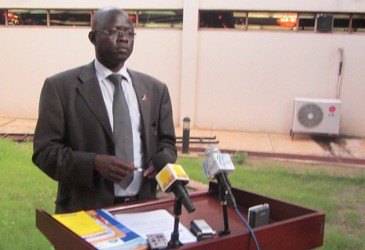
General Madut Biar Yel, South Sudan Minister of Telecommunication and Postal Services, takes questions from journalists on September 23,2011 in Juba. (photo by Ngor Garang-ST), a photo by Pan-African News Wire File Photos on Flickr.
South Sudan officials have stolen $4 billion: president
Mon, Jun 4 2012
By Hereward Holland
JUBA (Reuters) - South Sudanese officials have "stolen" an estimated $4 billion of public money and should return it to salvage the young nation's reputation and help lift its people out of poverty, the president said in a letter seen on Monday.
The request came as the central African country, which seceded from Sudan less than a year ago, is scrambling for cash to make up for the loss of almost all state revenues with the shutdown of its oil output in January.
Critics have accused the government of President Salva Kiir doing little to clamp down on widespread corruption that has hampered efforts to build the war-torn state from scratch and jumpstart development.
In a letter to 75 current and former officials dated May 3, Kiir offered amnesty for officials and individuals with government ties who returned the money.
"An estimated $4 billion are unaccounted for or, simply put, stolen by former and current officials, as well as corrupt individuals with close ties to government officials," Kiir said in the letter obtained by Reuters.
Reliable figures are hard to come by in South Sudan, but the figure could amount to around one third of the estimated total oil receipts allotted to the South between the 2005 peace deal that ended decades of civil war and independence last year.
"Most of these funds have been taken out of the country and deposited in foreign accounts. Some have purchased properties, often paid in cash," the letter said.
A senior South Sudan government official confirmed to Reuters that the letter was sent to current, former and deputy ministers in the last ten days.
Decades of conflict and economic neglect have left the nation of about 8.6 million people with some of the worst health and education statistics on the planet. Few paved roads exist outside the capital, Juba.
Secession from Sudan last July sparked widespread optimism among South Sudanese that their country would at last head toward prosperity, but lingering disputes with Khartoum and corruption have hobbled the economy since then.
South Sudan's Information Minister Barnaba Marial Benjamin said over half of the estimated $4 billion was from the country's so-called "durra" scandal, in which a large government purchase of sorghum was allegedly never distributed.
"It is a colossal sum," he said.
"WE FORGOT WHAT WE FOUGHT FOR"
South Sudan's ruling party, the Sudan People's Liberation Movement (SPLM), largely consists of former rebels who fought against Khartoum. Few have deep experience with civilian institutions or economic management.
Financial oversight, where it exists at all, is weak.
"We fought for freedom, justice and equality. Many of our friends died to achieve these objectives. Yet, once we got to power, we forgot what we fought for and began to enrich ourselves at the expense of our people," the letter read.
"The credibility of our government is on the line."
From 2005 until independence, Khartoum and Juba officially split oil revenues evenly - giving the South roughly $2 billion per year.
In November, South Sudan said it had contracted oil sales worth $3.2 billion for the period between July 9 and December 31. It is unclear how much was actually sold.
The landlocked country took control of about 350,000 barrels a day of oil output - around 75 percent of Sudan's total - at partition, but failed to agree how much it should pay Khartoum to use pipelines running through Sudan.
That dispute prompted the new nation to shut off its production in January, instantly erasing about 98 percent of state revenues and the country's dominant source of dollars.
Although the government has adopted an austerity budget to help curtail spending, a leaked document from the World Bank estimates foreign reserves will run out in July. South Sudanese officials insist the assessment overstates the danger.
South Sudan's anti-corruption committee has recovered an estimated $60 million from fraudulent transactions and misappropriation of funds by government officials, the president's office said in a June 1 press release.
It said Kiir sent eight letters to heads of state in Africa, the United States, Middle East, and Europe in January seeking assistance in the recovery of stolen funds by current and former South Sudanese officials.
(Additional reporting by Yara Bayoumy; Writing by Hereward Holland and Alexander Dziadosz; editing by Ron Askew)
No comments:
Post a Comment